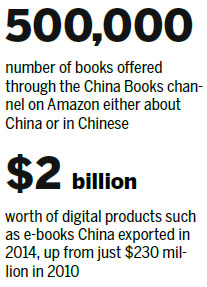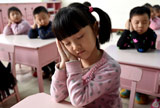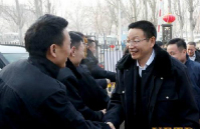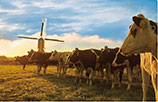World's readers delight in Chinese books
By Mei Jia (China Daily) Updated: 2016-02-15 08:03Chinese books are enjoying a surge in popularity overseas as growing numbers of international readers look to engage with the country's literary output, according to industry insiders.
The China Books channel on Amazon, which was launched by the US online shopping giant in 2011 with cooperation from China International Book Trading Corp, now offers 500,000 titles on China or in Chinese to readers from 185 countries or regions.
Topping its best-seller list on Sunday was Monkey, Arthur Waley's ever-popular English translation of the classic Chinese epic Journey to the West, and two Chinese New Year picture books.
Zhu Xiaojie, a project manager with China Books, said 260,000 books had been sold on the international market through "Amazon's e-commerce platform and channels" as of June 2015.
But the online store does more than simply act as a marketing channel for Chinese books, Zhu said. It also provides a platform for an updated selection of new titles to be introduced to the world, both in print and digital formats.
According to some experts, a growing trend toward digital publishing has helped China's efforts in reaching a wider reading audience, although Chen Yingming, head of the delegation to last year's Book Expo America 2015, said international book fairs still play their part.
The rise of Chinese literature on the world market was summed up by Wu Shangzhi, vice-minister of the State Administration of Press, Publication, Radio, Film and Television, in a recent speech.
He said China had sold the copyright to 10,293 books in 2014, the most recent year for which figures were available, which was a substantial increase on 2010, when only 5,691 copyrights were sold.
This was also "77.65 times more" than in 2003, he said.
Meanwhile, China exported $2 billion worth of digital products such as e-books, data journals and video games in 2014, up from just $230 million in 2010.
Among the best-sellers, translated into the most languages, were nonfiction titles such as President Xi Jinping's The Governance of China, and fictional works by Mo Yan and Liu Cixin, Wu said.
Chinese publishers are also actively promoting themselves abroad, establishing 450 overseas ventures in 50 countries and regions - with two publishing groups listed in the trade magazine Publisher's Weekly global top 50.
"Besides cooperating with foreign publishers, another secret is localization, and we strongly recommend that publishers employ native speakers as translators, to study the different tastes of different markets, and target books accordingly," Wu said.

|
Chinese books attract attention at an international book fair in Algiers, capital of Algeria. Xinhua |
- Xi and Germany's Gauck promote new opportunities
- Identity stolen, woman deprived of campus life
- Emotions contribute most to sleep troubles
- China says any third party will not affect its ties with Cuba
- President Xi meets German counterpart on stronger ties
- Image makeover: Perception of govt officials needs new look
- $88m vaccine sales case triggers probe
- China's 'Tianqin' program starts infrastructure construction
- Students get into the swing for spring
- Blacklist urged to halt invasive species








